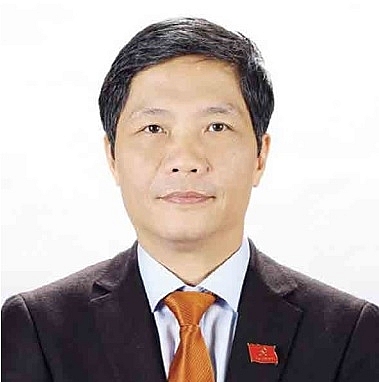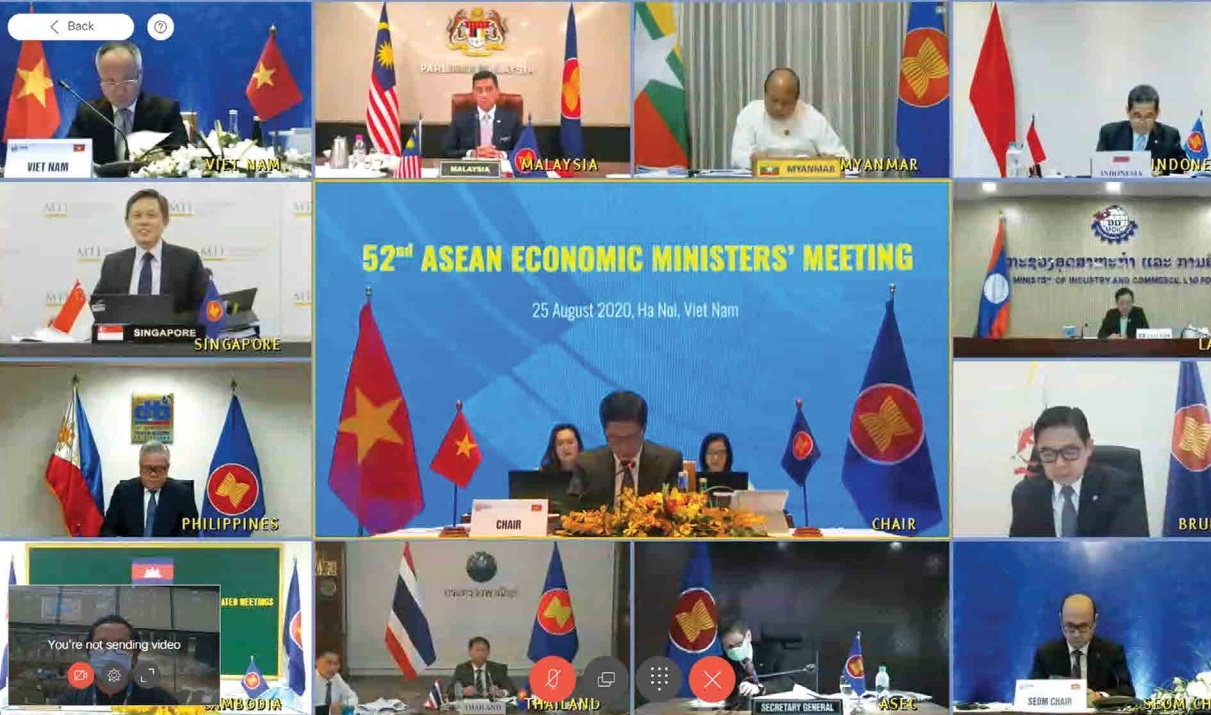Enhancing ASEAN cohesion to face down coming trials
 |
| Minister of Industry and Trade Tran Tuan Anh |
In the context of the diverse implications of the pandemic currently devastating the global economy, what were the priorities of participating countries on the agenda at the ASEAN Economic Ministers’ Meeting and ASEAN Free Trade Area Council?
This year is extraordinary as all countries have to deal with the coronavirus pandemic. Its implications and tackling measures have affected economic development in diverse facets. We, therefore, need to set out new priorities to supplement the 2020 Action Plan.
The first priority is looking at supply chain disruptions which have dealt a heavy blow to most ASEAN economies, as most members in the bloc are export-oriented. These activities play an important role in regional and international supply chains and show our heavy reliance on material sources as well as input supporting industry items for export production to serve major export markets.
Second, the measures for pandemic prevention and treatment have badly influenced the circulation of merchandise flows, with much of it essential for living, as well as activities for pandemic prevention and treatment.
We also looked at restrictions relevant to the movement of natural persons and resources due to COVID-19 implications, as well as the strong impacts on major export markets due to the application of measures for pandemic prevention.
Accordingly, ASEAN members need to work out measures to increase the resilience of our own economies and bolster adaptability to the new situation.
In the role as ASEAN chair, right from the outset of 2020, Vietnam has been proactive in coordinating with other members and the ASEAN Secretariat to pen out new contents to complement ASEAN high-level meetings, and mechanisms with the ASEAN+3 (Japan, China, and South Korea) and other partners to ensure reaching set targets and requirements in fighting the pandemic as well as facilitating intra-bloc economic development.
Hence, the goals for 2020 are the combination of long-term development targets, including the ASEAN Economic Community Strategy towards 2025 with 13 important initiatives Vietnam has built, which have been approved in the ASEAN cooperative framework.
Significantly, this year we must also achieve short-term goals in order to tackle the immediate problems of ASEAN economies that mostly affect small- and medium-sized enterprises (SMEs).
These contents got full exposure in the framework of the ASEAN Summit held in April, and associated meetings such as ASEAN Economic Ministers’ Meeting (AEM), ASEAN+3 Economic Ministers’ Meeting, and ASEAN-South Korea Economic Ministers’ Meeting.
Most recently, the ASEAN Economic Ministers’ Meeting held in August basically approved the long-term programme for economic rebound in ASEAN with multiple measures to expedite the set targets.
 |
| ASEAN has circumvented the ongoing crisis by carrying out business as usual via various online forums |
Can you offer more details on the initiatives that Vietnam has presented in the meetings and their significance to the bloc’s future development?
Vietnam has presented diverse initiatives embedded in the agenda of the ASEAN Economic Ministers’ Meeting related to the measures in dealing with COVID-19, or in the Joint Statement between ASEAN Economic Ministers and South Korea’s Economic Minister on enhancing supply chain connectivity with the engagement of ASEAN countries and South Korea.
ASEAN member countries show high consensus with the initiatives and the content Vietnam has presented. For instance, the countries commended the measures presented to help minimise the issuance of policies and non-tariff measures that might create barriers to intra-ASEAN businesses, while the measures to strengthen connectivity, particularly between SMEs, through support programmes in the public sector also won plaudits.
In addition, the efforts to foster digital transformation capitalising on an e-government IT platform, dubbed as a crucial fundament of the Hanoi Action Plan, were applauded by authorised agencies of engaging countries upon implementation. Notably, of the 13 priorities and initiatives on economic cooperation Vietnam has presented in 2020, two initiatives (the Building ASEAN Digital Integration Index, and Connecting ASEAN innovative centres) were completed at the time the 52nd AEM took place.
Other initiatives and priorities are under active implementation strictly following the set goals. Vietnam, other ASEAN members, and partner countries have been proactive in solving outstanding issues with the Regional Comprehensive Economic Partnership Agreement (RCEP), one of the economic cooperation priorities in the year Vietnam holds the ASEAN chair role.
Finally, Vietnam has given out important recommendations in forming a high-level ASEAN taskforce whose functions are studying and penning out measures assuring the accomplishment of dual targets: the effective prevention and tackling of COVID-19 while simultaneously enabling ASEAN countries to reach a new normal via enhanced connectivity between members and with outside partners.
Continuing on from joint statements and action plans on COVID-19 prevention, there has been another joint statement on strengthening ASEAN+3 co-operation. What is the message behind this statement?
Any ASEAN statement aims to realise the common goals of building a self-controlled and resilient ASEAN community against COVID-19 impacts.
With total merchandise value touching $2.8 trillion and GDP value surpassing $3 trillion, ASEAN is the fifth-largest economy on a global scale. In 2019, ASEAN countries managed a fair growth pace and made the list of GDP top performers. In addition, most ASEAN countries, including Vietnam, look forward to developing an export-oriented and open economy and are active members in international economic integration.
Hence, the requirements set in the statements and co-operative plans in ASEAN and ASEAN+3 centre on supporting the bloc to gradually perfect regulatory system in trade investment and economic management, and further enhance intra-ASEAN legal capacity, simultaneously striving to build up a framework and seamless infrastructure within the region, and connecting with ASEAN+3 economies.
Another important task in the ASEAN+3 framework is to empower existing supply chains along with enhancing their resilience and efficiency.
Partnership in this framework not only aims to ensure instant material supply sources, but also strives to increase connectivity and institutionalisation to facilitate the movement of investment flows, as well as market access opportunities among ASEAN countries and with partner nations.
The targets we are looking for are stepping up efforts to reach the goal of signing the historic RCEP in Hanoi in 2020, in parallel to opening more opportunities for connectivity with potential economic and trade partners in order to constitute more conducive frameworks in favour of ASEAN economies and businesses.
What the stars mean:
★ Poor ★ ★ Promising ★★★ Good ★★★★ Very good ★★★★★ Exceptional
 Tag:
Tag:
Themes: Drive ASEAN Forward
Related Contents
Latest News
More News
- NAB Innovation Centre underscores Vietnam’s appeal for tech investment (January 30, 2026 | 11:16)
- Vietnam moves towards market-based fuel management with E10 rollout (January 30, 2026 | 11:10)
- Vietnam startup funding enters a period of capital reset (January 30, 2026 | 11:06)
- Vietnam strengthens public debt management with World Bank and IMF (January 30, 2026 | 11:00)
- PM inspects APEC 2027 project progress in An Giang province (January 29, 2026 | 09:00)
- Vietnam among the world’s top 15 trading nations (January 28, 2026 | 17:12)
- Vietnam accelerates preparations for arbitration centre linked to new financial hub (January 28, 2026 | 17:09)
- Vietnam's IPO market on recovery trajectory (January 28, 2026 | 17:04)
- Digital economy takes centre stage in Vietnam’s new growth model (January 28, 2026 | 11:43)
- EU Council president to visit Vietnam amid partnership upgrade (January 28, 2026 | 11:00)






















 Mobile Version
Mobile Version